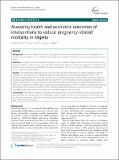| dc.contributor.author | Erim, Daniel Odey | |
| dc.contributor.author | Resch, Stephen C | |
| dc.contributor.author | Goldie, Sue J. | |
| dc.date.accessioned | 2013-04-25T18:40:15Z | |
| dc.date.issued | 2012 | |
| dc.identifier.citation | Erim, Daniel O., Stephen C. Resch, and Sue J. Goldie. 2012. Assessing health and economic outcomes of interventions to reduce pregnancy-related mortality in Nigeria. BMC Public Health 12:786. | en_US |
| dc.identifier.issn | 1471-2458 | en_US |
| dc.identifier.uri | http://nrs.harvard.edu/urn-3:HUL.InstRepos:10587991 | |
| dc.description.abstract | Background: Women in Nigeria face some of the highest maternal mortality risks in the world. We explore the benefits and cost-effectiveness of individual and integrated packages of interventions to prevent pregnancy-related deaths. Methods: We adapt a previously validated maternal mortality model to Nigeria. Model outcomes included clinical events, population measures, costs, and cost-effectiveness ratios. Separate models were adapted to Southwest and Northeast zones using survey-based data. Strategies consisted of improving coverage of effective interventions, and could include improved logistics. Results: Increasing family planning was the most effective individual intervention to reduce pregnancy-related mortality, was cost saving in the Southwest zone and cost-effective elsewhere, and prevented nearly 1 in 5 abortion-related deaths. However, with a singular focus on family planning and safe abortion, mortality reduction would plateau below MDG 5. Strategies that could prevent 4 out of 5 maternal deaths included an integrated and stepwise approach that includes increased skilled deliveries, facility births, access to antenatal/postpartum care, improved recognition of referral need, transport, and availability quality of EmOC in addition to family planning and safe abortion. The economic benefits of these strategies ranged from being cost-saving to having incremental cost-effectiveness ratios less than $500 per YLS, well below Nigeria’s per capita GDP. Conclusions: Early intensive efforts to improve family planning and control of fertility choices, accompanied by a stepwise effort to scale-up capacity for integrated maternal health services over several years, will save lives and provide equal or greater value than many public health interventions we consider among the most cost-effective (e.g., childhood immunization). | en_US |
| dc.language.iso | en_US | en_US |
| dc.publisher | BioMed Central | en_US |
| dc.relation.isversionof | doi:10.1186/1471-2458-12-786 | en_US |
| dc.relation.hasversion | http://www.ncbi.nlm.nih.gov/pmc/articles/PMC3491013/pdf/ | en_US |
| dash.license | LAA | |
| dc.title | Assessing Health and Economic Outcomes of Interventions to Reduce Pregnancy-Related Mortality in Nigeria | en_US |
| dc.type | Journal Article | en_US |
| dc.description.version | Version of Record | en_US |
| dc.relation.journal | BMC Public Health | en_US |
| dash.depositing.author | Erim, Daniel Odey | |
| dc.date.available | 2013-04-25T18:40:15Z | |
| dc.identifier.doi | 10.1186/1471-2458-12-786 | * |
| dash.contributor.affiliated | Erim, Daniel | |
| dash.contributor.affiliated | Resch, Stephen | |
| dash.contributor.affiliated | Goldie, Sue | |


